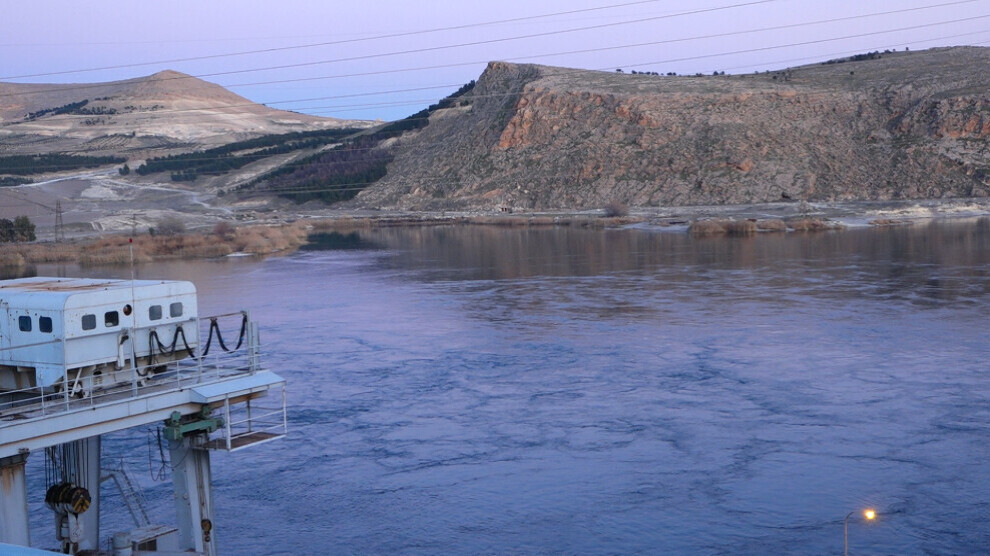Women of Kobanê: The Turkish state uses water as a weapon
“The Turkish state uses water as a weapon,” said women of Kobanê calling on the international community to stop the violation committed by the Turkish state, which has reduced the water of the Euphrates River.

NORŞİN ABDİ
Kobanê–On July 17, 1987, an agreement on the division of water of the Euphrates River was signed by Turkey and Syria. According to the agreement, Syria's share is 500 cubic meters of water per second; however, the Turkish state has reduced Syria's share of the Euphrates River water since 2017. Since last year, the Turkish state has intensified its policy of using water as a weapon every year while it continues to attack North and East Syria. Since the beginning of April 2022, the water level of the river has dropped by 4.5 meters, affecting the three dams built on the river.
By violating the agreement, the Turkish state prevents the flow of the Euphrates water to North and East Syria as part of its warfare policy against the people of the region. NuJINHA spoke to Halisa Haj Abdulkadir, Co-chair of the Water Directorate in Kobani Canton.
'We face difficulties in accessing to drinking water'
Underlining that the reduced water of the Euphrates River affects people and all living creatures in the region, Halisa Haj Abdulkadir said, “The Turkish state uses every means to weaken the will of the people living in the north and east of Syria and to displace them. As part of its invasion attacks, it cuts off the water and launches military and political operations. Due to the decrease in the water level of the river, we face difficulties in accessing drinking water and providing it to the people. Months ago, water pumps worked 10 hours a day without stopping to meet the needs of people.”
‘People cannot take their share’
Emphasizing that the Euphrates River supplies drinking water and water for irrigation and power generation, Halisa Haj Abdulkadir said, “Despite calls, the Turkish state continues to reduce the water because its aim is to destroy the water resources in the region.” Mentioning the Maraş earthquakes, she said, “The earthquakes also affected Syria. However, the Turkish state continues to carry out its dirty policies against Syria. The people of North and East Syria cannot take their share of the Euphrates River water. For this reason, we call on the international community and human rights organizations to put pressure on the Turkish state.”
‘The Turkish state violates international conventions’
Recalling that the Turkish state has reduced the water of the Euphrates River since 2017, Halisa Haj Abdulkadir said, “The Turkish state violates all international conventions and agreements by reducing the water of the Euphrates River and attacking the region with its warplanes.” Pointing to the international silence against the violations committed by the Turkish state, she said, “People suffer from the ongoing water and electricity shortages. The aim of the Turkish state is to depopulate the region; however, it will fail. We will not allow it to realize its aim. The aim of the Turkish state is to eliminate the people wanting democracy and equality.”
‘It causes a decrease in agricultural products’
Emine Şêxo from Kablik village in the west of the city told us the challenges experienced by them due to the decrease in the level of water. “There is a serious decrease in the water level in Kobanê. The Turkish state cuts off the water of the Euphrates River. Agriculture is very important for us because we earn a living from agriculture. The aim of the Turkish state is to displace us. The decrease in the water level means the decrease in agricultural products such as wheat, barley and vegetables.”
‘The international community should take a strong stand against the Turkish state’
Another woman of Kobanê, Mekiye Şêx Dimmir thinks the Turkish state started to use different methods against Kurdish people and Kurdish identity when it saw its military attacks failed. “The decrease of the water level of the Euphrates River also causes an outbreak of infectious diseases. It seriously affects the environment and agriculture. The international community should take a strong stand against the Turkish state.”
